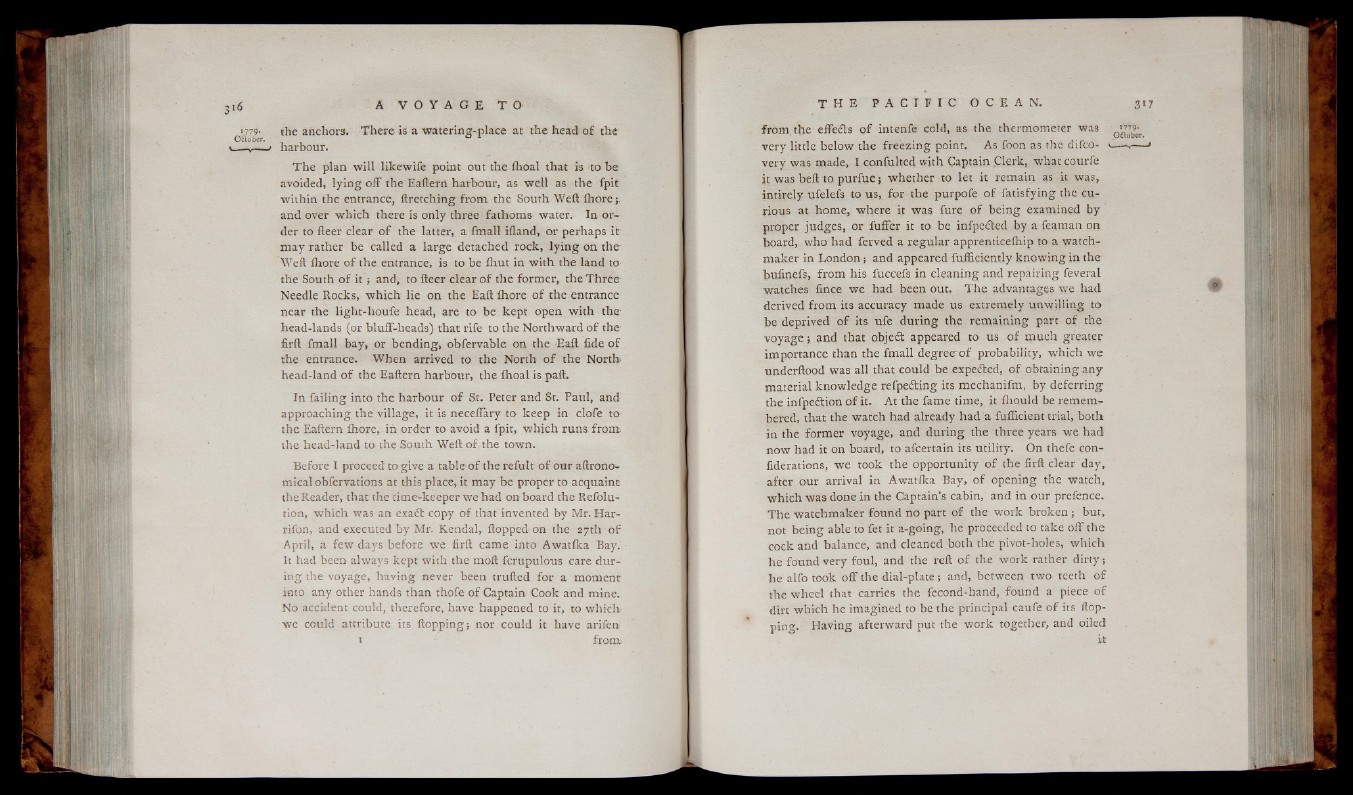
1779.
O f to b e r .
the anchors. T h e re is a watering-place at the head o f the
harbour.
T h e plan w ill likewife point out the Ihoal that is to be
avoided, ly in g o ff the Eaftern harbour, as w e ll as the fpit
within the entrance, ilretching from the South Weft fh o re ;
and over which there is only three fathoms water. In order
to fteer clear o f the latter, a fmall iiland, o r perhaps it
ma y rather be called a large detached rock, ly in g on the
Weft ihore o f the entrance, is to be ihut in with the land to
the South o f i t ; and, to fteer clear o f the former, the Three
Needle Rocks, which lie on the Eaft Ihore o f the entrance
near the light-houfe head, are to be kept open with th e
head-lands (or bluff-heads) that rife to the Northward o f the
firft fmall bay, or bending, obfervable on the Eaft fide o f
the entrance. When arrived to the North o f the North
head-land o f the Eaftern harbour, the ihoal is paft.
In failin g into the harbour o f St. Peter and St. Paul, and
approaching the village, it is neceffary tO' keep in clofe to
the Eaftern fhore, in order to avoid a fpit, w hich runs from
the head-land to the South Weft o f the town.
Before I proceed to give a table o f the refult o fou ra ftro n o -
mical obfervations at this place, it may be proper to acquaint
the Reader, that the time-keeper w e had on board the Refolu-
tion, which was an e xa it copy o f that invented by Mr. Har-
rifon, and executed by Mr. Kendal, flopped on the 27th o f
April, a few days before we firft came into Awatfka Bay.
It had been always kept with the moil fcrupulous care durin
g the voyage, ha vin g never been trufted fo r a moment
into any other hands than thofe o f Captain Cook and mine.
No accident could, therefore, have happened to it, to which
we could attribute its flopping; nor could it have arifen
r from
from the effects o f intenfe cold, as the thermometer was
very little below the fre e z in g point. As foon as the difco- >.
very was made, I confulted with Captain Clerk, what courfe
it was beft to p u r fu e ; whether to let it remain as it was,
intirely ufelefs to us, fo r the purpofe o f fatisfying the curious
at home, where it was fure o f being examined by
proper judg es, or fuffer it to be infpedted by a feaman on
hoard, who had ferved a regu lar apprenticeihip to a watchmaker
in London; and appeared fufficiently kn owin g in the
bufinefs, from his fuccefs in cleaning and repairing feveral
watches fince w e had been out. T h e advantages we had
derived from its accuracy made us extremely u nw illin g to
be deprived o f its ufe during the remaining part o f the
v o y a g e ; and that objeft appeared to us o f much greater
importance than the fmall d e g re e o f probability, which w e
underftood was all that could be expected, o f obtaining any
material knowledge refpedting its mechanifm, by deferring
the infpedtion o f it. At the fame time, it fhould be remembered,
that the watch had already had a fufficient trial, both
in the forme r voyage, and during the three years w e had
now had it on board, to afcertain its utility. On thefe con-
fiderations, w e took the opportunity o f the firft clear day,
after our arrival in Awatika Bay, o f opening the watch,
which was done in the Captain’s cabin, and in our prefence.
T he watchmaker found no part o f the work broken ; but,
not being able to fet it a-going, he proceeded to take o ff the
cock and balance, and cleaned both the pivot-holes, which
he found ve ry foul, and the reft o f the work rather d ir ty ;
he alfo took o ff the dial-plate ; and, between two teeth o f
the wheel that carries the fecond-hand, found a piece o f
dirt which he imagined to be the principal caufe o f its flopping.
Having afterward put the w ork together, and oiled